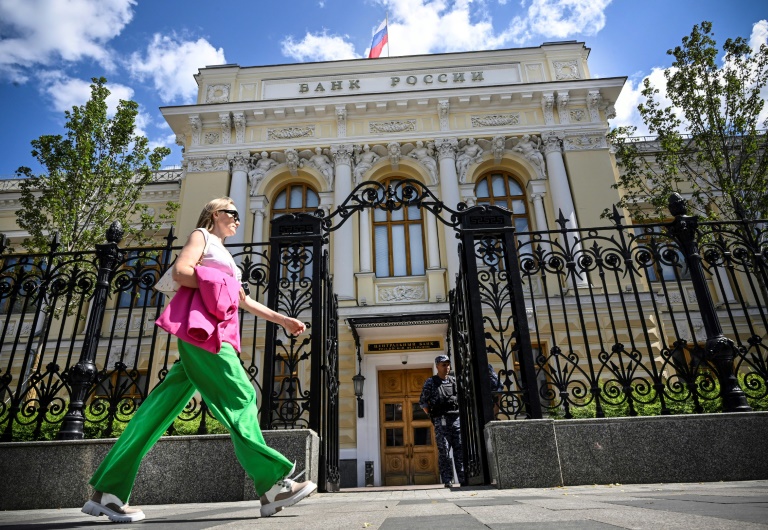Russia’s Central Bank predicts growth of no more than 1-2 percent this year (Alexander NEMENOV)
After three years of doom-defying growth, Russia’s heavily militarised economy is slowing, facing a widening budget deficit and weak oil prices, all under the threat of more Western sanctions.
Huge spending on guns, tanks, drones, missiles and soldiers for the Ukraine campaign helped ensure Moscow bucked predictions of economic collapse after it launched its offensive in 2022.
But as Kyiv’s most important backers head Sunday to Canada for the G7, where US President Donald Trump will face pressure to hit Russia with fresh sanctions, the Kremlin’s run of economic fortune is showing signs of fatigue.
“It is no longer possible to pull the economy along by the military-industrial complex alone,” Natalia Zubarevich, an economist at Moscow State University, told AFP.
Government spending has jumped 60 percent since before the offensive, with military outlays now at nine percent of GDP, according to President Vladimir Putin.
“Almost every other sector is showing zero or even negative growth,” said Zubarevich.
Russia’s economy expanded 1.4 percent on an annualised basis in the first quarter — down from 4.1 percent in 2024 to its lowest reading in two years.
The central bank predicts growth of no more than 1-2 percent this year.
Russia’s economy “is simply running out of steam”, Alexandra Prokopenko, a former central bank advisor and now analyst based outside Russia, wrote in a recent note.
– Oil reliance –
Putin, who has revelled in Russia’s strong performance, has brushed off concerns.
“We do not need such growth,” he said at the end of last year, when the slowdown started.
Rapid expansion risked creating “imbalances in the economy, that could cause us harm in the long run”, he said.
Top among those imbalances has been rapid inflation, running at around 10 percent.
The Central Bank last week nudged interest rates down from a two-decade-high saying price rises were moderating.
But those high borrowing costs — combined with falling oil prices — are the main factors behind the slowdown, economist Anton Tabakh told AFP.
Russia’s Urals blend of crude oil sold for an average of $52 a barrel in May, down from $68 in January — a big reduction in energy revenues, which make up more than a quarter of government income.
Russia this year has raised taxes on businesses and high earners, essentially forcing them to stump up more for the Ukraine offensive.
But the new income “only covers the shortfall in oil sales”, said Zubarevich.
With tighter finances, Russia’s parliament was this week forced to amend state spending plans for 2025. It now expects a budget deficit of 1.7 percent of GDP — three times higher than initially predicted.
Story Continues
